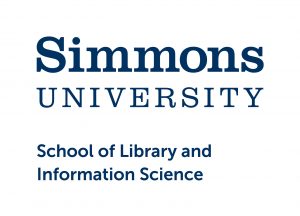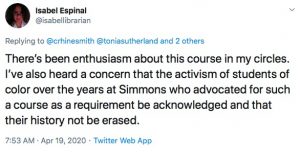 Over this academic year, our Simmons SLIS Diversity, Equity, and Inclusion (DEI) Committee has been working collaboratively with input from faculty, students, and staff to develop a new course for our graduate curriculum that addresses many of the challenges that have been identified by scholars and practitioners of color in our field. For example, in their (2018) paper “A Holistic Approach for Inclusive Librarianship: Decentering Whiteness in Our Profession,” Isabel Espinal, Tonia Sutherland, and Charlotte Roh outline the current scholarship on whiteness in LIS, which highlights the harms to librarians of color that include racial “microagressions” and other negative impacts that result from whiteness, white privilege, and systemic white supremacy that have and continue to shape public libraries in the U.S. today.
Over this academic year, our Simmons SLIS Diversity, Equity, and Inclusion (DEI) Committee has been working collaboratively with input from faculty, students, and staff to develop a new course for our graduate curriculum that addresses many of the challenges that have been identified by scholars and practitioners of color in our field. For example, in their (2018) paper “A Holistic Approach for Inclusive Librarianship: Decentering Whiteness in Our Profession,” Isabel Espinal, Tonia Sutherland, and Charlotte Roh outline the current scholarship on whiteness in LIS, which highlights the harms to librarians of color that include racial “microagressions” and other negative impacts that result from whiteness, white privilege, and systemic white supremacy that have and continue to shape public libraries in the U.S. today.
In response, our DEI Committee, with support from our graduate students, introduced a new course for our graduate curriculum which we have titled “Decentering Whiteness in LIS.” I am proud to announce the course proposal received overwhelming support from our SLIS faculty and will join our graduate curriculum.
The course is divided into three parts in response to Espinal, Sutherland, & Roh’s (2018) proposal:
- Overview of Whiteness in LIS
- History and social construction of whiteness
- White privilege, white fragility, and its critiques
- Intersectionality and Black feminist studies
- History of race and whiteness in LIS
- The Affective Implications of Whiteness in the Workplace
- Power, privilege, and oppression in LIS
- Racial microagressions at work
- Barriers to professional advancement
- Diversity, inclusion, and its critiques
- Moving Forward: Decentering Whiteness and Centering Librarians of Color
- Recognizing and resisting whiteness and oppression
- Interventions to promote greater equity in LIS
- Moving from microaggressions to microaffections
- Student action plans for decentering whiteness in LIS
We hope to offer the course in the Spring 2021 and believe it will serve as a foundation for our students to develop action plans they can use as professionals in the field to help increase diversity, equity, and inclusion. We also hope it will inspire other graduate programs, interested in developing similar courses to address issues of power, privilege, and oppression and to understand how it shapes practice in our field.
Update April 19, 2020:
 After sharing this post on Twitter, I noticed the following response from Isabel Espinal (pictured right). I absolutely agree that the course should include a recognition of this history of student activism at Simmons, which also played an important role in the development of our SLIS DEI Committee.
After sharing this post on Twitter, I noticed the following response from Isabel Espinal (pictured right). I absolutely agree that the course should include a recognition of this history of student activism at Simmons, which also played an important role in the development of our SLIS DEI Committee.
I am also hopeful that we will be able to develop a collaborative process online where we can gain further insights and input from a broader group of students, faculty, staff, and practitioners in the field to help develop each of the modules for the course. Ultimately, this course should be shared with everyone using an open license, such as a Creative Commons license, and could be adapted to fit the local contexts in whichever LIS program is interested in teaching the course.